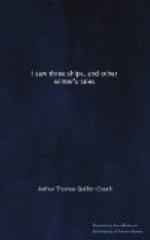“I’ll tell ‘ee. You see when Zeb was born, an’ the time runnin’ on for his christ’nin’, Rachel an’ me puzzled for days what to call en. At last I said, ’Look ’ere, I tell ‘ee what: you shut your eyes an’ open the Bible, anyhow, an’ I’ll shut mine an’ take a dive wi’ my finger, an’ we’ll call en by the nearest name I hits on.’ So we did. When we tuk en to church, tho’, there was a pretty shape. ‘Name this cheeld,’ says Pa’son Babbage. ‘Selah,’ says I, that bein’ the word we’d settled. ‘Selah?’ says he: ‘pack o’ stuff! that ain’t no manner o’ name. You might so well call en Amen.’ So bein’ hurried in mind, what wi’ the cheeld kickin’, an’ the water tricklin’ off the pa’son’s forefinger, an’ the sacred natur’ of the deed, I cudn’ think ’pon no name but my own; an’ Zeb he was christened.”
“Deary me,” commented Uncle Issy, “that’s a very life-like history. The wonder is, the self-same fix don’t happen at more christ’nin’s, ’tis so very life-like.”
A silence followed, full of thought. It was cut short by the rattle of wheels coming down the road, and Young Zeb’s grey mare hove in sight, with Young Zeb’s green cart, and Young Zeb himself standing up in it, wide-legged. He wore a colour as fresh as on Christmas morning, and seemed none the worse for his adventure.
“Hello!” he called, pulling up the mare; “‘mornin’, Uncle Issy— ‘mornin’, father.”
“Same to you, my son. Whither away?—as the man said once.”
“Aye, whither away?” chimed Uncle Issy; “for the pilchards be all gone up Channel these two months.”
“To Liskeard, for a chest-o’-drawers.” Young Zeb, to be ready for married life, had taken a house for himself—a neat cottage with a yard and stable, farther up the coombe. But stress of business had interfered with the furnishing until quite lately.
“Rate meogginy, I suppose, as befits a proud tradesman.”
“No: painted, but wi’ the twiddles put in so artfully you’d think ’twas rale. So, as ‘tis a fine day, I’m drivin’ in to Mister Pennyway’s shop o’ purpose to fetch it afore it be snapped up, for ‘tis a captivatin’ article. I’ll be back by six, tho’, i’ time to get into my clothes an’ grease my hair for the courant, up to Sheba.”
“Zeb,” said his father, abruptly, “‘tis a grand match you’m makin’, an’ you may call me a nincom, but I wish ye wasn’.”
“‘Tis lookin’ high,” put in Uncle Issy.
“A cat may look at a king, if he’s got his eyes about en,” Old Zeb went on, “let alone a legacy an’ a green cart. ’Tain’t that: ’tis the maid.”
“How’s mother?” asked the young man, to shift the conversation.
“Hugly, my son. Hi! Rachel!” he shouted, turning his head towards the cottage; and then went on, dropping his voice, “As between naybours, I’m fain to say she don’t shine this mornin’. Hi, mother! here’s Zebedee waitin’ to pay his respects.”
Mrs. Minards appeared on the cottage threshold, with a blue check duster round her head—a tall, angular woman, of severe deportment. Her husband’s bulletin, it is fair to say, had reference rather to her temper than to her personal attractions.




